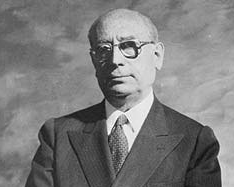Theoretical and political evolution of the thoughts of Enrique Tierno Galván

The target of this research is the analysis of the evolution of the theoretical thought of Enrique Tierno Galv�n (Madrid, 1918-1986); an evolution that, logically, was determined by the historical Spanish context that he lived – basically, Franco period and transition to the democracy – and travels parallel to his political evolution. Based on these premises, the search is organized in two parts: in the first part, Author and Context, we detail the elements that stand out of the biography of Tierno Galv�n, as well as those more determinant aspects of the Spanish history and of the context of the moment that allow to understand the intellectual trajectory and the political itinerary of the studied author. The second part, Political Theory and Practice, has to be considered as the central nucleus of the investigation.
The originality of the dissertation, if it can be said this way, is the will of his author to go beyond the periods proposed by the principal students of the work of Tierno Galv�n. From the detail of a few nuclei of reflection or nodules of thought, the plausible hypothesis, which the study confirms, is that of a continuity in the thought of Tierno Galv�n characterized by a triple thread: the dialectics Spain - Europe, Tradition and Modernity and Utopia and Pragmatism. A continuity, and a tension between the mentioned threads that, finally, are what gives sense and coherence to Tierno Galv�n as theoretical of the politics, and as political actor.
To go further, nevertheless, doesn’t mean to not to know or to despise, the periods known about the work of Tierno Galv�n up to today. On the contrary: it is from the knowledge and the study of the interest of Tierno Galv�n for the Baroque, the traditionalism, the functionalism, the Marxism and the sociological criticism of the capitalism, that alternative hypotheses can appear.
If in Tierno Galv�n "what" is important, "how" it is not less. "What" is what he says or writes. "How" is how he brings it to the practice. Consequently, it is a question of interpretations of historical aspects, of the viability of certain forms of government, or of the presentation of unpublished facets of Spanish authors, "what" and "how" is the way that Tierno Galv�n has of talking with other authors, of questioning about the big and small problems of his time.
More that in other ambiences of the knowledge, in the ambience of the political theory an almost unanimous agreement exists to accept the intimate connection between political conjuncture and thought. For the author of the investigation, in case of Enrique Tierno Galv�n this connection is narrower and larger. We would be, so, before a dissertation of intellectual history or of political thought, which would also inform about a time and a country.
References
Presented by the PhD student J. Carles Duran i Esteva, and directed by Dr. Isidre Molas and Batllori. The lecture took place in the Institute of Political and Social Sciences (ICPS), in Barcelona, on Monday, the 16th of July of 2007.


